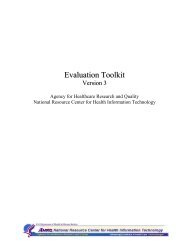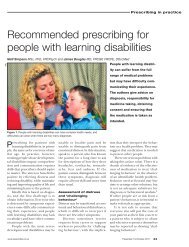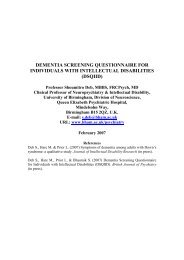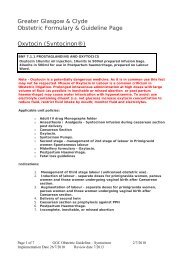The Fife Dementia Strategy: 2010 â 2020 - The Knowledge Network
The Fife Dementia Strategy: 2010 â 2020 - The Knowledge Network
The Fife Dementia Strategy: 2010 â 2020 - The Knowledge Network
You also want an ePaper? Increase the reach of your titles
YUMPU automatically turns print PDFs into web optimized ePapers that Google loves.
4.10 Long Term Care Facilities<br />
AIM<br />
People living with dementia in long term care receive quality care which<br />
meets their needs. Care is provided by well trained staff, in an appropriate<br />
environment and with meaningful activities. Each facility will be supported by a<br />
specialist mental health liaison service, and will work improve communication<br />
between residents’ families and make greater efforts to integrate into the local<br />
communities. Council owned care homes will act as centres for care, where<br />
information is shared amongst care at home, short break and long term care<br />
services that provide a complete spectrum of care in and for the community.<br />
RECOMMENDATIONS TO ACHIEVE THIS<br />
4.10.1 Staff at all levels are educated and supported to provide<br />
individualised care, and designated dementia care facilitators are<br />
identified within each facility.<br />
In <strong>Fife</strong> services continue to be developed to meet the needs of an increasing<br />
number of people living with dementia in the community, however it is<br />
recognised that for some people with dementia living in a long term care<br />
facility may be the most appropriate and effective way of meeting their<br />
individual needs. <strong>The</strong>re are a number of facilities within <strong>Fife</strong> that provide a<br />
high standard of care for people with dementia; however, as highlighted by the<br />
recent report Remember, I’m Still Me 56 , this is a minority.<br />
Currently there is an estimated 5700 people with dementia living in <strong>Fife</strong>.<br />
Approximately 63.5% of these people live in their own home in the community,<br />
while the remaining 36.5% live in long term care 57 . An estimated 700 people<br />
living in long term care with dementia have not received a medical diagnosis<br />
of dementia 58 . Consultations in <strong>Fife</strong> have shown that long term care staff<br />
recognise that a number of people have undiagnosed dementia, but they feel<br />
that there is ‘no real point’ in getting a diagnosis. This is not true as there are<br />
benefits in diagnosing progressed cases of dementia including increased<br />
understanding of the person and potentially their behaviour, reduction in<br />
Long Term Care Facilities - A term used to refer to an array of residential<br />
facilities which provide long term care. <strong>The</strong>se commonly include care<br />
homes (residential and nursing) as well as long stay and continuing care<br />
wards in hospital. Other, non-residential services which provide long term<br />
care are addressed in Care at Home (4.7) and Short Breaks (4.9).<br />
56 Care Commission & Mental Welfare Commission for Scotland (2009). Remember, I’m Still<br />
Me.<br />
57 Alzheimer’s Society (2007). <strong>Dementia</strong> UK.<br />
58 Alzheimer Scotland. (2007). <strong>The</strong> <strong>Dementia</strong> Epidemic – Where Scotland is now and the<br />
challenge ahead. Edinburgh.<br />
69
















